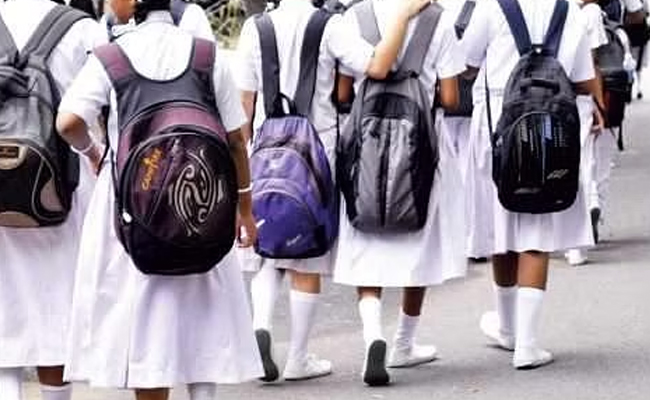Bengaluru: The Education Department of Karnataka has issued a circular, based on earlier survey reports, stating that the school bag weight may be between 1.5 kg and 5 kg, depending on the age of the child, adding that schools should have a ‘no bag day’ once a week.
Going by the report ‘Learning Without Load’ submitted by the Yashpal Verma Committee of 1993, ‘School Bag Policy 2020’ of the Central Government, the survey report submitted by the Centre for Child and the Law, the State Department of Education Research and Training as well as the recommendations of orthopaedic experts, the Education Department has said that school children may carry a maximum load of 15 per cent of their body weight.
The weights of the school bag have been set by the Education Department as 1.5 kg to 2 kg for children of Classes 1 and 2; 2 kg to 3 kg for children of Classes 3 to 5; 3 kg to 4 kg for children of Classes 6 to 8; and 5 kg for children of Classes 9 and 10. The circular adds that every school should observe a ‘no bag day’ once a week, preferably on Saturdays.
School teachers have been instructed to ensure that the study material for a day, including textbooks, does not exceed the given weight limit. The notebooks should not be more than 200 pages. Every school should have drinking water facility, to save the children from having to carry additional weight of water bottles. Parents of the students too should be made aware of the ill-effects of carrying heavy school bags, the Department has said in the circular, with a warning that stringent action would be taken against schools and teachers who violate the instruction regarding the matter.
Let the Truth be known. If you read VB and like VB, please be a VB Supporter and Help us deliver the Truth to one and all.
Panaji (PTI): As part of a crackdown against tourist establishments violating laws and safety norms in the aftermath of the Arpora fire tragedy, Goa authorities on Saturday sealed a renowned club at Vagator and revoked the fire department NOC of another club.
Cafe CO2 Goa, located on a cliff overlooking the Arabian Sea at Vagator beach in North Goa, was sealed. The move came two days after Goya Club, also in Vagator, was shut down for alleged violations of rules.
Elsewhere, campaigning for local body polls, AAP leader Arvind Kejriwal said the fire incident at Birch by Romeo Lane nightclub at Arpora, which claimed 25 lives on December 6, happened because the BJP government in the state was corrupt.
An inspection of Cafe CO2 Goa by a state government-appointed team revealed that the establishment, with a seating capacity of 250, did not possess a no-objection certificate (NOC) of the Fire and Emergency Services Department. The club, which sits atop Ozrant Cliff, also did not have structural stability, the team found.
The Fire and Emergency Services on Saturday also revoked the NOC issued to Diaz Pool Club and Bar at Anjuna as the fire extinguishers installed in the establishment were found to be inadequate, said divisional fire officer Shripad Gawas.
A notice was issued to Nitin Wadhwa, the partner of the club, he said in the order.
Campaigning at Chimbel village near Panaji in support of his party's Zilla Panchayat election candidate, Aam Aadmi Party leader Kejriwal said the nightclub fire at Arpora happened because of the "corruption of the Pramod Sawant-led state government."
"Why this fire incident happened? I read in the newspapers that the nightclub had no occupancy certificate, no building licence, no excise licence, no construction licence or trade licence. The entire club was illegal but still it was going on," he said.
"How could it go on? Couldn't Pramod Sawant or anyone else see it? I was told that hafta (bribe) was being paid," the former Delhi chief minister said.
A person can not work without bribing officials in the coastal state, Kejriwal said, alleging that officers, MLAs and even ministers are accepting bribes.





